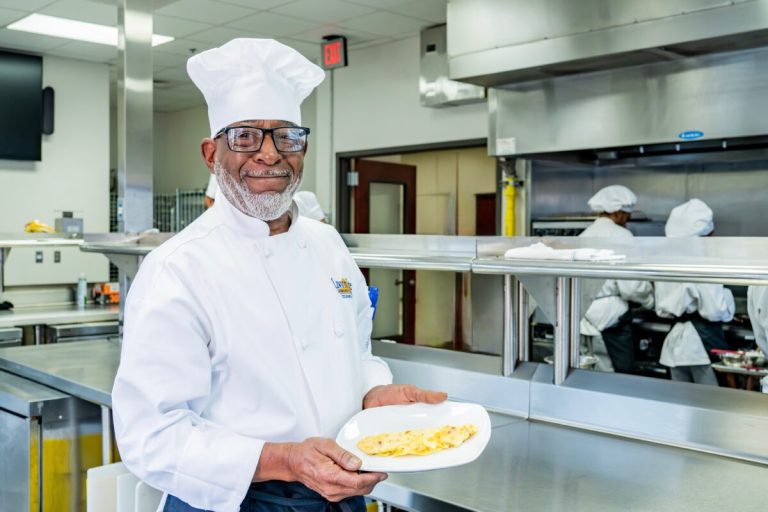Reviewed by: Sharron Swain
5 myths busted about this ‘Cow College’
Reading time: 6 minutes
Sponsored

Auburn’s nickname as a ‘Cow College’ has been a proud slogan of the university ever since Bear Bryant threw out the term before losing to Auburn in the iconic 1972 Iron Bowl.
But, Auburn’s College of Agriculture is also on a mission to bust some ‘Cow College’ myths, showcasing that agriculture is more than farmers and cattle. Read on to check out these five myths you might believe.
Asking Auburn students about misconceptions
Myth #1: Agriculture is all farmers and cows

To get to the bottom of the common ‘Cow College’ myths, we met with Dr. Jenny Koebernick—associate professor in the Crop, Soil and Environmental Sciences department at Auburn.
Dr. Koebernick never thought she’d get into agriculture. She started out studying biology and chemistry, planning to be a pharmacist.
However, after her undergrad degree, Dr. Koebernick did not go to pharmacy school. Instead, she started working at a local agricultural experiment station and was offered an assistantship to get a master’s.
.
She ended up getting a master’s in Crop Physiology and a PhD in Agronomy with an emphasis in cotton breeding. Her story is proof that agriculture is for more people than those who grew up on a farm.
“Agriculture is more vast than we realize. If you gave me an example of any department or college on Auburn’s campus, I could tell you a way that agriculture is involved.”
Dr. Jenny Koebernick, Auburn Professor, Crop, Soil + Environmental Science
Here are just a few examples of those connections:
- Agriculture Business + Economics students learn foundational and theoretical business principles through the College of Business that can apply to crop sales and more.
- Animal Sciences majors are closely linked with the College of Veterinary Medicine, and many work part-time at the large and small animal teaching hospitals.
- Applied Biotechnology students collaborate with Auburn College of Sciences and Mathematics on research and are excited to be building a new customized lab on campus.
- Crop, Soil and Environmental Sciences majors help maintain campus landscaping and the Auburn athletic facilities, including the football field
- Horticulture students grow food on campus that’s used in student dining facilities.
- Check out a full list of Auburn’s College of Agriculture majors.
Myth #2: You won’t make a lot of money in agriculture

Majoring in agriculture at the ‘Cow College’ could be your ticket to job security and a high-paying salary.
“The amount of students graduating with a degree in agriculture are only filling up a small fraction of the jobs that are available. The demand for more students to study agriculture is high.”
Dr. Jenny Koebernick, Auburn Professor, Crop, Soil + Environmental Science
Along with a high job demand, the agricultural field also features top-notch salaries. Here’s a quick look into average annual earnings for various careers*:
- $153,648: Biosystems engineer (Biosystems Engineering degree)
- $130,117: Poultry scientist (Poultry Science degree)
- $109,621: Golf Superintendent (Crop, Soil and Environmental Science)
- $102,270: Molecular Biologist (Applied Biotechnology degree)
- $99,484: Agribusiness Manager (Agricultural Business + Economics degree)
*Note: Salaries vary based on location, experience required + degree level
Myth #3: There aren’t opportunities for women in the field

Dr. Koebernick is a testimony to the fact that women can be immensely successful in the field of agriculture.
“Yes, there are times when it feels like most of my colleagues are male—there’s no denying that. But no one’s ever said a woman can’t be successful in agriculture.
I never had the mentality that I couldn’t succeed. I just said, ‘hey, these are the things I need to be successful in this career,’ and I made it happen.”
Dr. Jenny Koebernick, Auburn Professor, Crop, Soil and Environmental Science
Dr. Koebernick said that the longer she’s been in the field, the more women she’s seen pursue agricultural careers.
Let’s look at some statistics from the USDA 2017 census of women in agriculture:
- 1.2 million female farmers/ranchers, making up 36% of all ranchers in the U.S.
- 27% increase in female farmers/ranchers from 2012-2017
Note: This study examines farmers and ranchers, not other agricultural career paths, like veterinarians, horticulturalists, etc.
Myth #4: You’re tied down if you work in agriculture
Many people imagine that working in agriculture means you have to live on a farm for the rest of your life. However, Dr. Koebernick said that one of the reasons she got into agriculture was to travel more.
“When I was deciding what career I wanted to pursue, I knew I wanted something that would challenge me and allow me to travel. Since graduate school, I’ve traveled to Canada, Scotland China, Mexico, and Austria—and lived 6 years in Australia.”
Dr. Jenny Koebernick, Auburn Professor, Crop, Soil + Environmental Science
Auburn Agriculture students get the chance to go on study abroad trips and travel within the U.S. for national conferences.
Myth #5: Agriculture is just practical, not scientific

One of the appealing aspects of agriculture is that it’s a hands-on career field. However, it’s much more complex than that.
Agriculture is a great example of an applied science—a practice of going beyond compiling information and experiments with practical outcomes.
Although there are a few majors that don’t go as deep into science, many degree paths—like Applied Biotechnology, Crop and Soil Science and Animal Sciences—fulfill most of the requirements for medical or pharmacy school.
“A lot of people think agriculture is a surface-level field but it is actually the application of the basic sciences of biology, chemistry, math and physics. There’s a misconception of how deep we actually go and how much training we have to do to be a professional in our field.”
Dr. Jenny Koebernick, Auburn Professor, Crop, Soil and Environmental Science
Ready to find a career path that can take you wherever you want to go? Check out Auburn’s College of Agriculture today.
Sponsored by:









